 W
WThe 50th Law is a New York Times bestselling book on strategy and fearlessness written collaboratively by rapper 50 Cent and author Robert Greene. The book is a semi-autobiographical account detailing 50 Cent's rise as both a young urban hustler and as an up-and-coming musician with lessons and anecdotes from historical figures such as Abraham Lincoln, Sun Tzu, Socrates, Napoleon, Malcolm X, and James Baldwin.
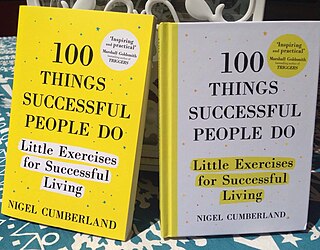 W
W100 Things Successful People Do: Little Exercises for Successful Living is a self-help guide by Nigel Cumberland.
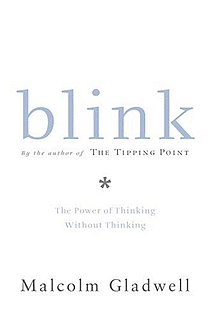 W
WBlink: The Power of Thinking Without Thinking (2005) is Malcolm Gladwell's second book. It presents in popular science format research from psychology and behavioral economics on the adaptive unconscious: mental processes that work rapidly and automatically from relatively little information. It considers both the strengths of the adaptive unconscious, for example in expert judgment, and its pitfalls, such as prejudice and stereotypes.
 W
WA Bright Red Scream: Self-Mutilation and the Language of Pain is a 1998 non-fiction psychology book written by American journalist Marilee Strong about self-harm. Published by Viking Press, it is the first general interest book on self-harm.
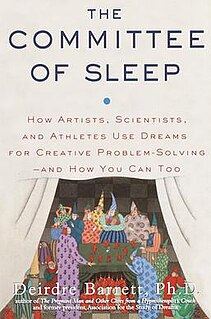 W
WThe Committee of Sleep: How Artists, Scientists, and Athletes Use Dreams for Creative Problem-Solving—and How You Can Too is a book by Deirdre Barrett published by Crown/Random House in 2001. Barrett is a psychologist on the faculty of Harvard Medical School. The book describes how dreams have contributed practical breakthroughs to arts and sciences in the waking world. Chapters are organized by discipline: art, literature, science, sports, medicine, etc. There are long examples of dreams which led to major achievements in each area, but Barrett then draws conclusions about how dreams go about solving problems, what types they are best at, and gives advice on how readers can apply these techniques to their own endeavors. Those who are described in The Committee of Sleep as having dreamed creations include Ludwig van Beethoven, Billy Joel, Robert Louis Stevenson, Stephen King, Salvador Dalí, William Blake, and Nobel prize winner Otto Loewi.
 W
WThe Dangerous Case of Donald Trump is a 2017 book edited by Bandy X. Lee, a forensic psychiatrist, containing essays from 27 psychiatrists, psychologists, and other mental health professionals describing the "clear and present danger" that US President Donald Trump's mental health poses to the "nation and individual well being". The book was an instant New York Times Best Seller, and high demand led to a second edition, with 10 additional mental health professionals and some non-professionals. Lee has maintained that the book remains strictly a public service, and all royalties were donated to the public good to remove any conflict of interest.
 W
WDavid and Goliath: Underdogs, Misfits, and the Art of Battling Giants is a non-fiction book written by Malcolm Gladwell and published by Little, Brown and Company on October 1, 2013. The book focuses on the probability of improbable events occurring in situations where one outcome is greatly favored over the other. The book contains many different stories of these underdogs who wind up beating the odds, the most famous being the story of David and Goliath. Despite generally negative reviews, the book was a bestseller, rising to #4 on The New York Times Hardcover Non-fiction chart, and #5 on USA Today's Best-Selling Books.
 W
WThe End of Night: Searching for Natural Darkness in an Age of Artificial Light is a 2013 non-fiction book by Paul Bogard on the gradual disappearance, due to light pollution, of true darkness from the night skies of most people on the planet. Bogard examines the effects of this loss on human physical and mental health, society, and ecosystems, and how it might be mitigated.
 W
WThe Five Love Languages: How to Express Heartfelt Commitment to Your Mate is a 1992 book by Gary Chapman. It outlines five general ways that romantic partners express and experience love, which Chapman calls "love languages". They are acts of service, gift-giving, physical touch, quality time, and words of affirmation.
 W
WGames People Play: The Psychology of Human Relationships is a bestselling 1964 book by psychiatrist Eric Berne. Since its publication it has sold more than five million copies. The book describes both functional and dysfunctional social interactions.
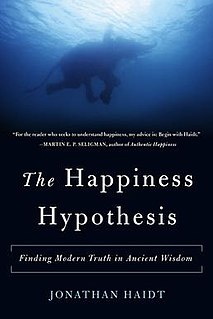 W
WThe Happiness Hypothesis: Finding Modern Truth in Ancient Wisdom is a 2006 psychology book written by Jonathan Haidt for a general audience. In it, Haidt poses several "Great Ideas" on happiness espoused by thinkers of the past—Plato, Buddha, Jesus, and others—and examines them in the light of contemporary psychological research, extracting from them any lessons that still apply to our modern lives. Central to the book are the concepts of virtue, happiness, fulfillment, and meaning.
 W
WHelp at Any Cost: How the Troubled-Teen Industry Cons Parents and Hurts Kids is a non-fiction book by Maia Szalavitz analyzing the controversy surrounding the tough love behavior modification industry. The book was published February 16, 2006, by Riverhead Books. Szalavitz focuses on four programs: Straight, Incorporated, a copy of the Straight Inc. program called KIDS, North Star wilderness boot camp, and the World Wide Association of Specialty Programs and Schools. She discusses the background, history and methodology of the troubled-teen industry, including techniques drawn from attack therapy and Synanon. She uses first-person accounts and court testimony in her research, and states that no evidence exists proving that these programs are effective. The book also includes advice for parents and an appendix with additional resources on how to get responsible help for teenagers.
 W
WHow We Decide, is a 2009 book by journalist Jonah Lehrer, that provides biological explanations of how people make decisions and offers suggestions for making better decisions. It is published as The Decisive Moment: How the Brain Makes Up Its Mind in the United Kingdom.
 W
WThe Intangibles of Leadership: The 10 Qualities of Superior Executive Performance is a book on business leadership, written by management psychologist Richard A. Davis, Ph.D. The book was published on July 26, 2010 by Jossey-Bass.
 W
WMen Are Like Waffles — Women Are Like Spaghetti is a 2001 book written by Bill and Pam Farrell, co-directors and founders of relationship counseling organization Masterful Living. It is based on an analogy comparing men to waffles and women to spaghetti. In this analogy, the walled boxes that together constitute waffles symbolize men's psychological compartmentalization while the overlapping nature of spaghetti symbolizes women's favoring of psychological interconnectedness.
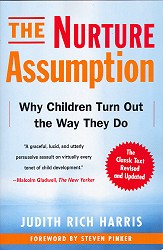 W
WThe Nurture Assumption: Why Children Turn Out the Way They Do is a 1998 book by the psychologist Judith Rich Harris. Originally published 1998 by the Free Press, which published a revised edition in 2009. The book was a 1999 Pulitzer Prize finalist.
 W
WOutliers: The Story of Success is the third non-fiction book written by Malcolm Gladwell and published by Little, Brown and Company on November 18, 2008. In Outliers, Gladwell examines the factors that contribute to high levels of success. To support his thesis, he examines why the majority of Canadian ice hockey players are born in the first few months of the calendar year, how Microsoft co-founder Bill Gates achieved his extreme wealth, how the Beatles became one of the most successful musical acts in human history, how Joseph Flom built Skadden, Arps, Slate, Meagher & Flom into one of the most successful law firms in the world, how cultural differences play a large part in perceived intelligence and rational decision making, and how two people with exceptional intelligence, Christopher Langan and J. Robert Oppenheimer, end up with such vastly different fortunes. Throughout the publication, Gladwell repeatedly mentions the "10,000-Hour Rule", claiming that the key to achieving world-class expertise in any skill, is, to a large extent, a matter of practicing the correct way, for a total of around 10,000 hours, though the authors of the original study this was based on have disputed Gladwell's usage.
 W
WParanormality: Why we see what isn't there is a 2011 book about the paranormal by psychologist and magician Richard Wiseman. Wiseman argues that paranormal phenomena such as psychics, telepathy, ghosts, out-of-body experiences, prophesy and more do not exist, and explores why people continue to believe, and what that tells us about human behavior and the way the brain functions. Wiseman uses QR codes throughout the book, which link to YouTube videos as examples and as experiments the reader can participate in to further explain the phenomena. Because of a cautious American publishing market, it was only available in America through Kindle. Paranormality was awarded the Center for Inquiry's Robert P. Balles award for 2011.
 W
WThe Psychology of the Occult is a 1952 skeptical book on the paranormal by psychologist D. H. Rawcliffe. It was later published as Illusions and Delusions of the Supernatural and the Occult (1959) and Occult and Supernatural Phenomena (1988) by Dover Publications. Biologist Julian Huxley wrote a foreword to the book.
 W
WThe Psychology of the Psychic is a skeptical analysis of some of the most publicized cases of parapsychological research by psychologists David Marks and Richard Kammann. The first edition, published in 1980, highlights some of the best-known cases from the 1970s. The second edition, published in 2000, adds information from the intervening 20 years as well as substantially more documentation and references to the original material.
 W
WThe Psychology of The Simpsons: D'oh! is a non-fiction book analyzing psychology themes in the television series The Simpsons. It contains content from several contributors, including psychologists, counselors and school therapists. The book was edited by Alan S. Brown, Ph.D., and Chris Logan, and was published on March 1, 2006 by BenBella Books. It has received praise from reviewers.
 W
WQuiet Power: The Secret Strengths of Introverts is a 2016 non-fiction book written by Susan Cain with Gregory Mone and Erica Moroz, and illustrated by Grant Snider.
 W
WQuiet: The Power of Introverts in a World That Can't Stop Talking is a 2012 non-fiction book written by Susan Cain. Cain argues that modern Western culture misunderstands and undervalues the traits and capabilities of introverted people, leading to "a colossal waste of talent, energy, and happiness".
 W
WThe Sekhmet Hypothesis was first published in book form in 1995 by Iain Spence. It suggested that pop trends of an atavistic nature could be analysed in relation to Dr. Timothy Leary's interpersonal circumplex model. It also suggested that major youth trends could be correlated to peaks in the 11 year solar cycle; this idea was later rejected by the author in 1999.
 W
WA Separate Creation: The Search for the Biological Origins of Sexual Orientation, also published with the subtitle How Biology Makes Us Gay, is a 1996 book about the development of sexual orientation by the journalist Chandler Burr. It received mainly positive reviews, commending it as a useful discussion of scientific research on sexual orientation and the politics surrounding the issue.
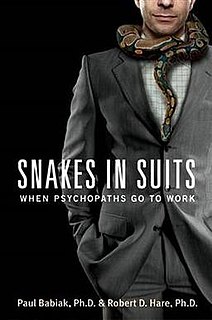 W
WSnakes in Suits: When Psychopaths Go to Work is a 2006 non-fiction book by industrial psychologist Paul Babiak and criminal psychologist Robert D. Hare.
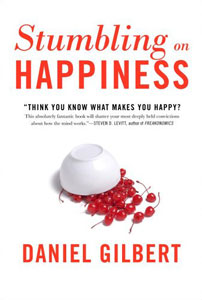 W
WStumbling on Happiness is a non-fiction book by Daniel Gilbert. It was published in the United States and Canada in 2006 by Knopf, and has been translated into more than 30 languages. It is a New York Times bestseller.
 W
WWhy People Believe Weird Things: Pseudoscience, Superstition, and Other Confusions of Our Time is a 1997 book by science writer Michael Shermer. The foreword was written by Stephen Jay Gould.
 W
WWired for Thought: How the Brain is Shaping the Future of the Internet is a book by entrepreneur Jeffrey Stibel that argues that the human brain and the Internet are similar and suggests that the Internet is further evolving into a brain. Besides his focus on the science and technology behind this evolution, the author also discusses its effects on Internet companies. The book was published by Harvard University Press in 2009.
 W
WThe Worry Trap: How to Free Yourself from Worry & Anxiety Using Acceptance & Commitment Therapy is a self-help book written by Chad LeJeune, Ph.D. in 2007.